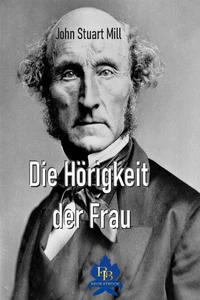Autobiography
Par :Formats :
Disponible dans votre compte client Decitre ou Furet du Nord dès validation de votre commande. Le format ePub est :
- Compatible avec une lecture sur My Vivlio (smartphone, tablette, ordinateur)
- Compatible avec une lecture sur liseuses Vivlio
- Pour les liseuses autres que Vivlio, vous devez utiliser le logiciel Adobe Digital Edition. Non compatible avec la lecture sur les liseuses Kindle, Remarkable et Sony
 , qui est-ce ?
, qui est-ce ?Notre partenaire de plateforme de lecture numérique où vous retrouverez l'ensemble de vos ebooks gratuitement
Pour en savoir plus sur nos ebooks, consultez notre aide en ligne ici
- Nombre de pages191
- FormatePub
- ISBN859-65--4732222-1
- EAN8596547322221
- Date de parution15/09/2022
- Protection num.Digital Watermarking
- Taille428 Ko
- Infos supplémentairesepub
- ÉditeurDIGICAT
Résumé
In his profound work, "Autobiography, " John Stuart Mill offers a compelling exploration of his intellectual development and personal experiences that shaped his philosophical perspectives. This narrative is not merely a recounting of events but serves as an insightful examination of the interplay between individual liberty, utilitarian ethics, and the pursuit of truth. Through a reflective first-person style, Mill presents a vivid account of his struggles and triumphs, delving into the influences that molded his thoughts - especially the rigorous education imposed by his father and the intellectual companionship of figures like Jeremy Bentham.
This text not only enriches the reader's understanding of Mill's thoughts on free will but also situates them within the broader context of 19th-century philosophical discourse. John Stuart Mill (1806-1873) was a prominent British philosopher, political economist, and civil servant, recognized for his advocacy of liberalism and social reform. Raised in an environment brimming with rigorous intellectual discussion, Mill's upbringing by his father, James Mill, who was a close associate of Bentham, played a pivotal role in shaping his analytical skills and commitment to philosophical inquiry.
His "Autobiography" reveals the emotional and intellectual currents that steered him toward his advanced thoughts on liberty, equality, and the role of individual agency in society. "Autobiography" is not only a personal narrative but also a crucial resource for anyone interested in the foundations of modern liberal thought. It encourages readers to critically engage with the evolution of Mill's ideas while reflecting on the broader implications of personal liberty and social responsibility.
This mesmerizing account is essential for scholars, students, and general readers alike, as it offers invaluable insights into a titan of philosophy and the societal dynamics of his time.
This text not only enriches the reader's understanding of Mill's thoughts on free will but also situates them within the broader context of 19th-century philosophical discourse. John Stuart Mill (1806-1873) was a prominent British philosopher, political economist, and civil servant, recognized for his advocacy of liberalism and social reform. Raised in an environment brimming with rigorous intellectual discussion, Mill's upbringing by his father, James Mill, who was a close associate of Bentham, played a pivotal role in shaping his analytical skills and commitment to philosophical inquiry.
His "Autobiography" reveals the emotional and intellectual currents that steered him toward his advanced thoughts on liberty, equality, and the role of individual agency in society. "Autobiography" is not only a personal narrative but also a crucial resource for anyone interested in the foundations of modern liberal thought. It encourages readers to critically engage with the evolution of Mill's ideas while reflecting on the broader implications of personal liberty and social responsibility.
This mesmerizing account is essential for scholars, students, and general readers alike, as it offers invaluable insights into a titan of philosophy and the societal dynamics of his time.
In his profound work, "Autobiography, " John Stuart Mill offers a compelling exploration of his intellectual development and personal experiences that shaped his philosophical perspectives. This narrative is not merely a recounting of events but serves as an insightful examination of the interplay between individual liberty, utilitarian ethics, and the pursuit of truth. Through a reflective first-person style, Mill presents a vivid account of his struggles and triumphs, delving into the influences that molded his thoughts - especially the rigorous education imposed by his father and the intellectual companionship of figures like Jeremy Bentham.
This text not only enriches the reader's understanding of Mill's thoughts on free will but also situates them within the broader context of 19th-century philosophical discourse. John Stuart Mill (1806-1873) was a prominent British philosopher, political economist, and civil servant, recognized for his advocacy of liberalism and social reform. Raised in an environment brimming with rigorous intellectual discussion, Mill's upbringing by his father, James Mill, who was a close associate of Bentham, played a pivotal role in shaping his analytical skills and commitment to philosophical inquiry.
His "Autobiography" reveals the emotional and intellectual currents that steered him toward his advanced thoughts on liberty, equality, and the role of individual agency in society. "Autobiography" is not only a personal narrative but also a crucial resource for anyone interested in the foundations of modern liberal thought. It encourages readers to critically engage with the evolution of Mill's ideas while reflecting on the broader implications of personal liberty and social responsibility.
This mesmerizing account is essential for scholars, students, and general readers alike, as it offers invaluable insights into a titan of philosophy and the societal dynamics of his time.
This text not only enriches the reader's understanding of Mill's thoughts on free will but also situates them within the broader context of 19th-century philosophical discourse. John Stuart Mill (1806-1873) was a prominent British philosopher, political economist, and civil servant, recognized for his advocacy of liberalism and social reform. Raised in an environment brimming with rigorous intellectual discussion, Mill's upbringing by his father, James Mill, who was a close associate of Bentham, played a pivotal role in shaping his analytical skills and commitment to philosophical inquiry.
His "Autobiography" reveals the emotional and intellectual currents that steered him toward his advanced thoughts on liberty, equality, and the role of individual agency in society. "Autobiography" is not only a personal narrative but also a crucial resource for anyone interested in the foundations of modern liberal thought. It encourages readers to critically engage with the evolution of Mill's ideas while reflecting on the broader implications of personal liberty and social responsibility.
This mesmerizing account is essential for scholars, students, and general readers alike, as it offers invaluable insights into a titan of philosophy and the societal dynamics of his time.









